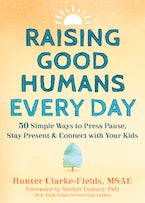By Hunter Clarke-Fields, MSAE, author of Raising Good Humans Every Day
When you meditate, you introduce far-reaching and long-lasting benefits into your life. You can lower your stress and reactivity, improve your focus and your connections to others, and reduce brain chatter. So how do you do it? I read books about mindfulness for a decade before I started practicing. A decade! Through that experience, I found out that (lo and behold) application of something makes a far greater impact than reading about it. Just as reading about tennis will not make you a better player than time on the court will, dear reader, you will get far more out of this if you actually practice mindfulness. Even if you have an infant or can’t sit still. First, the gold standard of mindfulness practice: sitting meditation. No, you don’t have to contort your legs or hold your hands in a funny way. In fact, you can practice sitting meditation anywhere you sit! Got a La-Z-Boy? Go for it. As long as you can be comfortable and alert, it counts.
Sitting Meditation
Sitting meditation is about bringing your attention back to the present moment with an attitude of curiosity and kindness. We develop the ability to be comfortable in our own skin. To start a sitting meditation practice:
· Find a place and time to sit where you can be (relatively) undistracted. If you have a parenting partner, you may have to ask for help with this.
· Sit in a position that’s comfortable for you, that you can stay in for a while. (You want to stay awake, so maybe not too comfortable.)
· Start small, three to five minutes at a time for the first week. Even one minute of mindfulness meditation a day is better than none at all. Work your way up to fifteen minutes (maybe a few years later).
· Aim to practice six days a week at about the same time each day.
· Begin with guided meditation. It helps to have a teacher reminding you what you’re doing!
· Unclench your jaw and let your belly be soft. You don’t have to fight your way through your meditation experience.
· Choose a neutral sensation in the present moment as your anchor to bring yourself back when your mind wanders. This can be the breath, the feeling of sitting, or ambient sounds.
· Your goal is to relax and gently bring your attention back to your anchor without judgment.
· Don’t expect blissful clarity and angelic singing. Bring your curiosity and kindness to whatever you experience.
· When you notice your mind wandering, it can help to note it. You may say to yourself silently thinking, planning, and so on.
· End each session with kindness. Congratulate yourself for doing the practice!
· At first, reward yourself for your practice time—this will help you to build and ingrain this life-transforming new habit. Eventually your new equanimity will be all the reward you need to keep it up.
Calm, Peace Meditation
When your mind is going bonkers during meditation, it helps to have something more than the breath to return you to the present moment. In Thích Nhât Hanh’s Plum Village community, they teach rhyming phrases that can act as an anchor. Do this meditation in the same manner as the sitting meditation above, but repeat these phrases silently in conjunction with your breathing:
1. Breathing in, I calm my body. Breathing out, I feel peace.
2. Breathing in, I smile, Breathing out, I release.
3. As the phrases become more familiar, you can shorten to Calm, peace, smile, release.
These practices are a fantastic basic toolkit for mindfulness meditation. You can use them interchangeably; each will help you steady your heart, mind, and nervous system, helping you become a calmer, more grounded parent.
Hunter Clarke-Fields, MSAE, is creator of Mindful Parenting, host of the Mindful Mama podcast, and author of Raising Good Humans. She coaches parents on how to cultivate mindfulness in their daily lives and cooperation in their families. Hunter has more than twenty years of experience in meditation practices, and has taught thousands worldwide.



 2024 Peace Playbook: 3 Tactics to Avoid Clashes with Your Partner
2024 Peace Playbook: 3 Tactics to Avoid Clashes with Your Partner